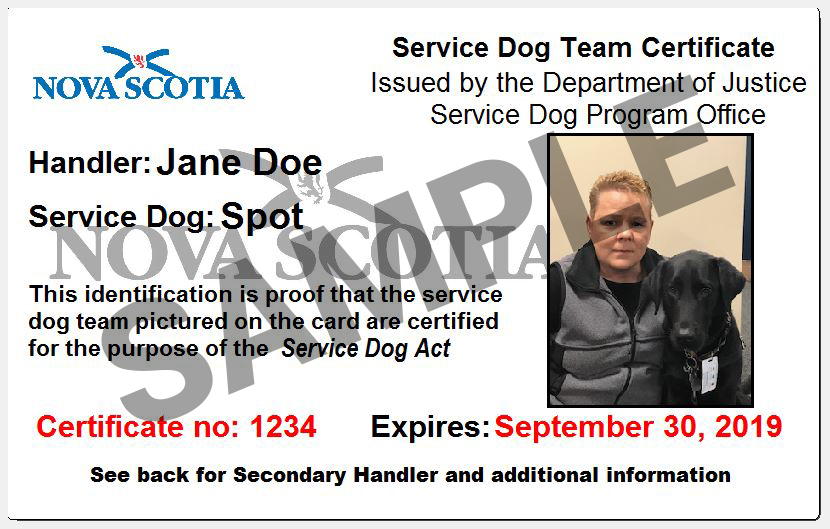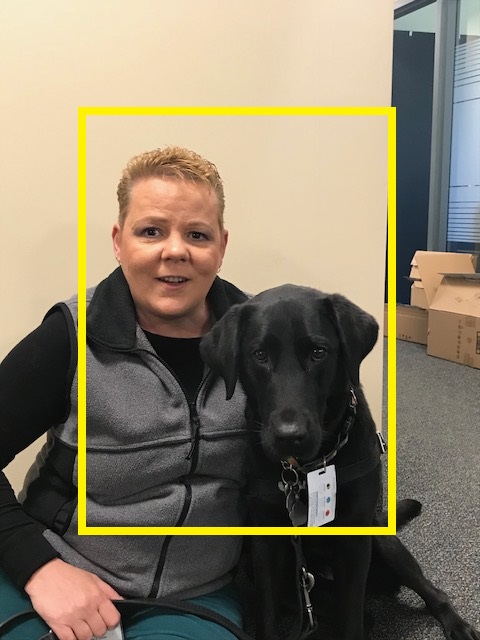Applying for service dog team certification
Certification gives service dog teams the right to access any location where the public is allowed.
Under the Service Dog Act, it is an offence to deny access or tenancy to a certified service dog team or to falsely represent a dog as a member of a service dog team under the Act when it is not. To report a violation, contact the Service Dog Program.
Service dog identification cards

Certified service dog teams will receive identification cards .
The cards will provide a consistent way to verify that a service dog, certified under the Act, is trained and meets the high standard of behaviour for service dogs. The cards are intended to reduce misunderstandings and delays when you access public places with your service dog.
There is no charge for the application or the identification card.
Service dogs trained by accredited schools
If a dog has been trained by an accredited training school like Assistance Dogs International, you must submit :
- a completed application form for service dog (Accredited Schools)
- written confirmation from the accredited training school that the service dog has completed training
- a passport-size photograph of the applicant and the dog taken together - service dog photo guidelines:
- photo must clearly show the user and the service dog
- the user and the service dog must be facing the camera
- the face of the user and the service dog must be clear and visible
- the image must be a close-up portrait format
- there can be no other dogs or people in the photo
- the background should not be the same color as the service dog
- the size of the photo should be 70mm x 50mm

Service dogs trained by accredited schools do not need to pass an assessment.
Service dogs not trained by accredited schools
If a dog has not been trained by an accredited training school, the handler and the dog will also need to pass a service dog assessment administered by St. John Ambulance.
To book an assessment, please submit the following documents to the Department of Justice, Service Dog program:
- a completed application form for a service dog (Privately Trained)
- a completed medical form confirming the need for a service dog , completed by a physician or nurse practitioner
- a veterinarian form confirming the dog has been spayed or neutered
- a passport-size photograph of the applicant and the dog taken together - service dog photo guidelines:
- photo must clearly show the user and the service dog
- the user and the service dog must be facing the camera
- the face of the user and the service dog must be clear and visible
- the image must be a close-up portrait format
- there can be no other dogs or people in the photo
- the background should not be the same color as the service dog
- the size of the photo should be 70mm x 50mm
You’ll be notified of a date and time for your service dog assessment when we’ve received your application and supporting documents.
Service dog assessment
There is a $187.50 fee for the service dog assessment. If you’re receiving income supports you may be eligible to have the fee waived.
The assessment consists of 40 exercises that assess if a dog is calm, stable and reliable in situations that dog and handler teams commonly encounter. It also evaluates if:
- the handler has control over the dog
- the dog is safe to be in public and demonstrates appropriate public behaviour
- the dog demonstrates the high standard of training required of service dogs
To prepare for the service dog assessment test, please review the Nova Scotia Service Dog Assessment test
Dog-in-training certification
Dogs being trained by accredited training schools are eligible for dog-in-training certification. Certification allows dogs to train in public places as long as they’re accompanied by a certified dog trainer. Contact us for more information.
Retired service dog certification
Certified service dogs that have retired and remain with their handlers can receive retirement certification. This gives them tenancy rights so they can continue living with their handlers. Contact us for more information.
Retired service dogs don’t have access to restaurants, hotels, buses or other public places like working service dogs.
Travelling to Nova Scotia with a service dog
If you are planning to travel to Nova Scotia, you may want to apply for a service dog identification card (certification).
If you have certification from another province with equivalent Service Dog legislation, please contact our office for more information.
Information
Resources
- What is a Service Dog
- Where will I see Service Dogs
- What does a Service Dog do
- How do I Interact with a Service Dog
Forms
- Service Dog Certificate (Privately trained)
- Service Dog Certificate (Accredited School)
- Medical Recommendation for a Service Dog
- Veterinary Requirements for a Service Dog
Contact Information
Department of Justice, Service Dog Program
1681 Granville Street, Joseph Howe Building
Halifax, NS B3J 2L6
Toll free: 1-888-760-5577 (Press 6)
Phone: 902-424-8805
Fax: 902-424-0700
Email: servicedogs@novascotia.ca
